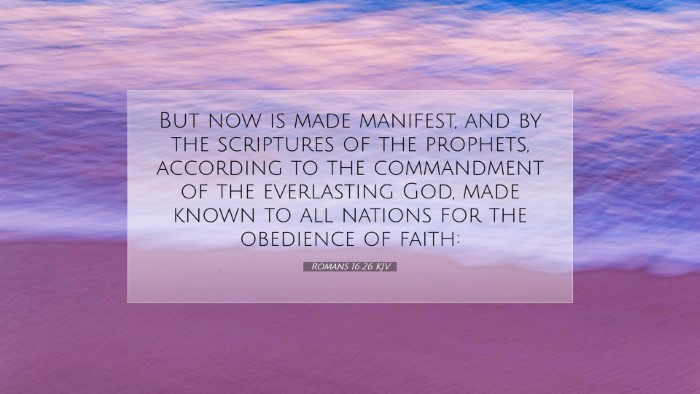Commentary on Romans 16:26
Verse Context: Romans 16:26 reads: "But now is made manifest, and by the scriptures of the prophets, according to the commandment of the everlasting God, made known to all nations for the obedience of faith." This verse serves as a concluding statement in the Apostle Paul’s epistle to the Romans, encapsulating the purpose and the proclamation of the Gospel.
General Overview
This verse synthesizes several profound theological themes: the revelation of God’s plan through Scripture, the authority of the prophets, and the universal call to faith among all nations. It emphasizes the transition from mystery to manifestation — a central theme in Pauline theology, pointing to the disclosure of God’s redemptive plan through Christ.
Insights from Matthew Henry
Matthew Henry underscores the significance of divine revelation. He remarks that God's wisdom is made manifest to the world, especially through the writings of the prophets, which lay the groundwork for the understanding of the Gospel. Henry particularly highlights:
- Manifestation of God’s Purpose: The hidden mysteries of God's redemptive plan have been revealed, aligning with the prophetic Scriptures.
- The Role of the Prophets: Their writings are authoritative in unveiling the Gospel to the nations, validating the continuity of God’s promises.
- Obedience of Faith: The ultimate goal of this revelation is obedience, which is the proper response to God’s grace.
Insights from Albert Barnes
Albert Barnes adds layers of understanding regarding the “commandment of the everlasting God.” He interprets this as a decree that attests to God’s eternal purpose and plan in Christ. Barnes elaborates on the following aspects:
- Eternal Perspective: The Gospel is not a mere afterthought but a central, eternal plan of God revealed in time.
- Universal Call: The phrase ‘made known to all nations’ emphasizes the inclusivity of the Gospel, breaking barriers and extending grace beyond Jewish confines.
- Call to Obedience: Faith is not just belief but an active obedience that flows from understanding God’s revelation.
Insights from Adam Clarke
Adam Clarke elaborates on the theological implications of this verse with special attention to its contextual framing within Romans. Clarke impresses the following points:
- Revelation in History: Clarke notes how the notion of “manifest” suggests a pivotal moment in history, where God’s plan is unveiled through Christ and recognized by the faithful.
- Scriptural Foundation: He stresses that the Scriptures play a critical role in establishing the truth of the Gospel, being essential for teaching and rebuke.
- Obedience Coupled with Faith: Faith is shown here as a dynamic relationship with God that encompasses trust and a commitment to His revealed word.
Theological Implications
The theological richness of Romans 16:26 opens several avenues for meditation and application:
- Revelation and Response: The manifestation of God’s truth demands a responsive faith — not mere intellectual assent but an active lifestyle that aligns with God’s command.
- Mission of the Church: The church is called to carry this message of hope to all nations, emphasizing its role in fulfilling the Great Commission as outlined in Matthew 28:19-20.
- Continuity of God’s Plan: Understanding the interconnections between the Old and the New Testaments encourages a comprehensive view of Scripture and God’s unfolding plan throughout human history.
Conclusion
In conclusion, Romans 16:26 encapsulates the heart of Paul's message and the essence of the Christian faith: the revelation of God through the prophets, the universal call to obedience through faith, and the ongoing mission of the church to share the Gospel with the world. As pastors, students, theologians, and scholars delve into this text, they are urged to grasp its profound implications and to embrace the transformative power of the Gospel that continues to resonate through the ages.


